By Li Weilin, Wang Yicheng, Cen Shenyi
Randy W. Schekman, the 76-year-old 2013 Nobel Prize winner, has been crisscrossing China from Hainan to Beijing to Shanghai, championing a cause close to his heart: the free flow of scientific knowledge across borders.
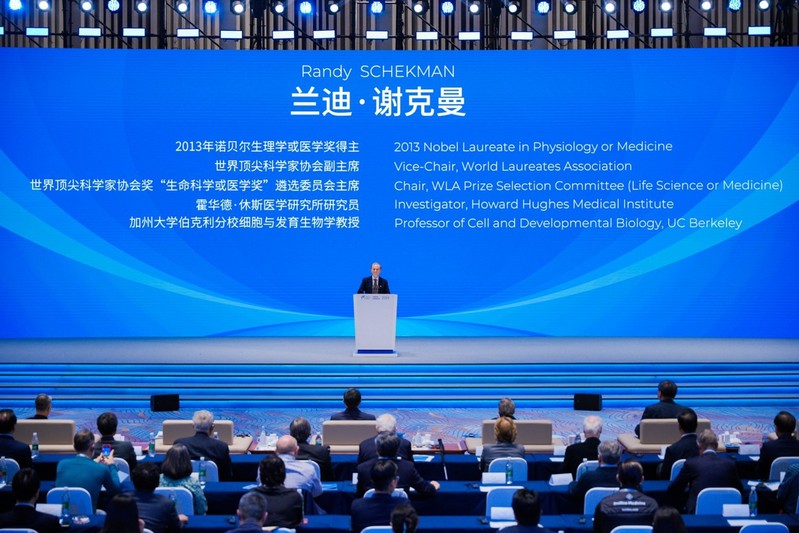
Schekman delivers a speech at the opening of 2024 WLA Forum. (Photo: WLA)
Details of Schekman’s dedication to transnational collaboration are evident throughout his career. In his Berkeley office hangs Chinese calligraphy reading “membrane protein yeast biology.” This gift from a graduating Chinese postdoctoral fellow represented more than scientific terms – it symbolized scientific exchange and academic mentorship, he noted.
“Our mission is to unite leading scientists worldwide, from rising stars to established experts, fostering dialogue about natural science discoveries and their vital applications in human health, technological advancement, and economic development,” said Schekman, who has participated in the WLA Forum for seven consecutive years since its inception. He still stands up for his views on free scientific communication, information sharing, and teamwork in research that advances humankind.
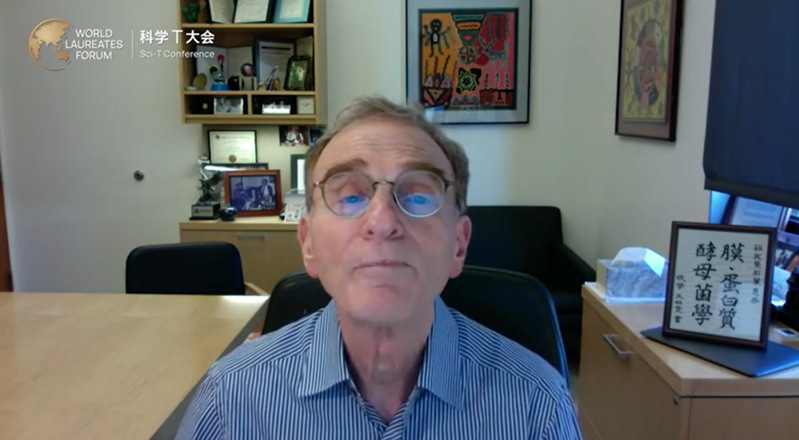
The calligraphy work is on Schekman’s desk. (Photo provided to People’s Daily)
Overcoming Adversity
“I never never wanted to give up,” reflected Schekman, during an exclusive interview with People’s Daily on October 26. “I never wanted to.”
His scientific odyssey began with a simple toy microscope at age 10. Captivated by the miniature world revealed through its lens, young Schekman would spend countless hours observing a drop of pond water. This childhood fascination laid the foundation for his lifelong dedication to biological research.
His scientific pursuits earned him the 2013 Nobel Prize in Physiology or Medicine for his groundbreaking work on cell vesicle transport and regulation mechanisms. In recent years, Schekman has dedicated his expertise to research on Parkinson's disease, a field that carries profound public importance and resonates with him on a deeply personal level. The loss of his wife to Parkinson’s syndrome seven years ago transformed his grief into an unwavering commitment to scientific discovery.
Schekman later assumed chairmanship of the Scientific Advisory Board at the Parkinson’s Disease Research Alliance, where he has spearheaded an international collaborative network comprising 163 laboratories from 80 institutions across 14 countries over the past five years. Through this program, researchers collaborate online, engage in open discussions, share findings, protocols, and insights, and jointly publish research results. “I hope it’s a kind of billion-dollar gamble, but you know, nothing ventured, nothing gained,” he stated.
“Finding joy in success and perseverance in failure—that’s the essence of experimental science,” Schekman explained. His early research at UC Berkeley, which centered on yeast cells, initially faced skepticism and funding rejections. “It was a shocking blow, unlike anything I’d experienced before,” he recalled.
During that tough period, he once doubted his decision. However, he persevered and met some exceptional students whose talent and hard work reignited his hope. With their assistance, his lab rapidly made significant progress, and research results began to emerge. He reflected, “I consider myself fortunate. In many ways, I feel particularly lucky.”
During those high-pressure research days, Schekman found solace in classical music, often listening through headphones during long flights or attending performances by the Vienna Philharmonic. His passion for life and appreciation for the arts have enabled him to strike a perfect balance between scientific pursuits and personal fulfillment.
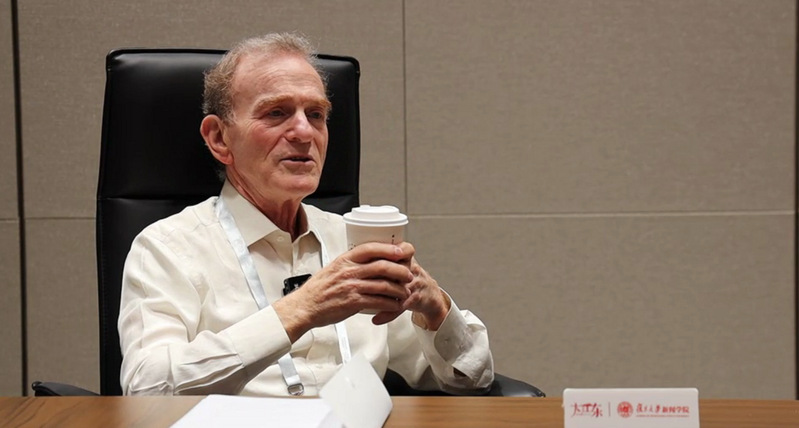
Schekman is interviewed by People’s Daily(Photo provided to People’s Daily)
Drawing the Line for Basic Scientific Research
“The primary mission of scientists is fundamental discovery, which serves as the cornerstone of all technological progress,” Schekman asserted. He placed great emphasis on and advocates for basic scientific research.
Schekman encouraged scientists to pursue basic science, noting that while there might not be immediate commercial applications visible in the short term, the profound impact and potential value would be inestimable. This long-term perspective and adherence to the essence of science are reflected in Schekman’s exploration of the secretion process in yeast. Initially, he did not anticipate any real-world uses, but as his research progressed, he found a striking similarity between the secretion process in yeast and that in human cells. This discovery provided significant insights for the biotechnology industry.
Schekman also places great importance on transparency in publicly funded research. He emphasized, “As long as the work conducted in labs and universities is openly available and not hidden behind paywalls, I have no objections to this. However, I draw the line at restricting access to publicly funded research.” He suggested that scientific research should not be driven by commercial interests but should be based on the principles of openness and sharing. “There should be no restrictions on communications in basic science. The findings will be published openly regardless,” he said, opposing any form of academic monopoly.
The translation of basic scientific research into practical applications does not happen overnight and requires a far-sighted vision and sustained support from government and society. “Ongoing investment in basic science and infrastructure is key to propelling the development of industry and biotechnology firms,” Schekman said. In his view, scientific research and the development of new drugs involves substantial long-term commitment and patience, given the uncertainties in the journey from the lab to the market.
At the WLA Forum’s youth session, Schekman expresses concern over the pervasive publishing culture in high-profile journals, describing it as a “toxic influence” on scientific priorities. “This mindset is deeply entrenched globally and affects how researchers promote their work. Don’t allow yourself to be hijacked by this system,” he cautioned.
Is publishing in high-impact-factor journals the sole measure of success? Schekman poses this question. “When academic success is judged by the publication of papers, scholarly research becomes a self-fulfilling prophecy,” he said bluntly. “Academic success should not be measured by the publication of papers alone.”
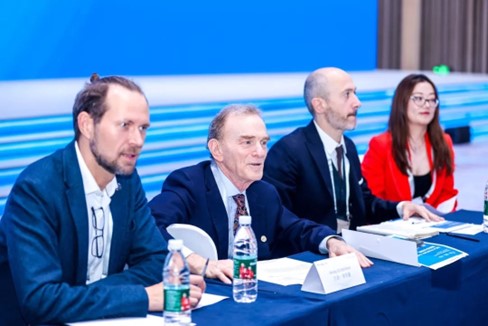
Schekman participates in the 2024 Young Scientists Conference at the WLA Forum. (Photo: WLA)
In the exclusive interview, Schekman expressed his open attitude towards AI’s role in scientific research. “I don't think it's going to replace my job anytime soon, but as a tool, as you know, science advances in large measure because of the development of powerful new tools. And AI is as powerful a tool as we have,” he noted. He pointed out how AI has rapidly transformed biologists’ work methods, citing the breakthrough achievements of AlphaFold in protein structure prediction. He also mentioned the revolutionary impact of Green Fluorescent Protein (GFP), which enabled scientists to observe structures and molecules in living cells in a way that was not possible before. He believed AI’s applications would extend well beyond biology, envisioning it as a tool that would serve the society as a whole.
Uniting Minds in Scientific Dialogue
On October 23rd, in Beijing, Schekman presented a friend with a golden chocolate coin bearing the image of Alfred Nobel from the Nobel Museum during his participation in the 2024 World Science and Technology Development Forum.
At this conference, which promoted an open and inclusive environment for collaboration in basic science, this meaningful gift prepared by Schekman symbolized his deep connection to the Nobel Prize as well as his commitment to dialogue and exchange between the scientific communities of the East and West.
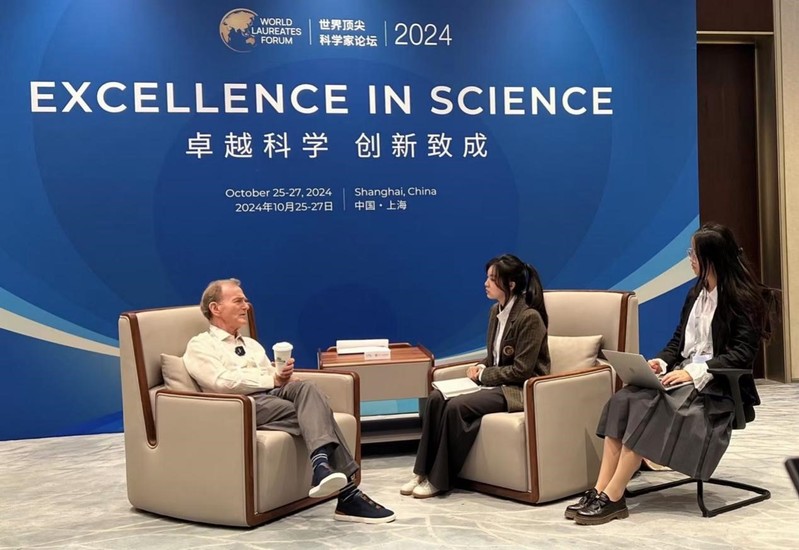
Schekman is interviewed by People’s Daily. (Photo provided to People’s Daily)
He has repeatedly emphasized in public the significance of open and inclusive international academic exchanges, especially in basic sciences. In the exclusive interview, Schekman said, “The WLA Forum offers an opportunity for us to come here and engage more with Chinese scientists.” As for China’s investment and advancements in the field of science, Schekman spoke highly of it from a professional point of view: “Unlike many countries, China understands that there has to be substantial and consistent investment in the basic science.”
“In 2002, I was invited by Chinese scholars to visit China‘s mainland for the first time. We attended an academic conference in Shanghai and visited Fudan University,” Schekman recalled. Over the past two decades, he has witnessed the social progress and scientific advancement in China. He said many of his Chinese students had received full financial support for their research in China and had stepped onto a broader research platform. This was his pride and joy.
“I’ll keep speaking out until I’m dead.” Schekman asserted, calling on scientists to keep working hard to improve the scientific publishing mechanism and promote the free flow and sharing of knowledge.

